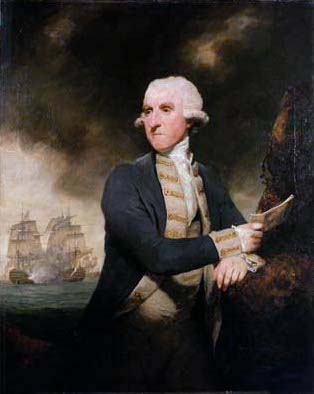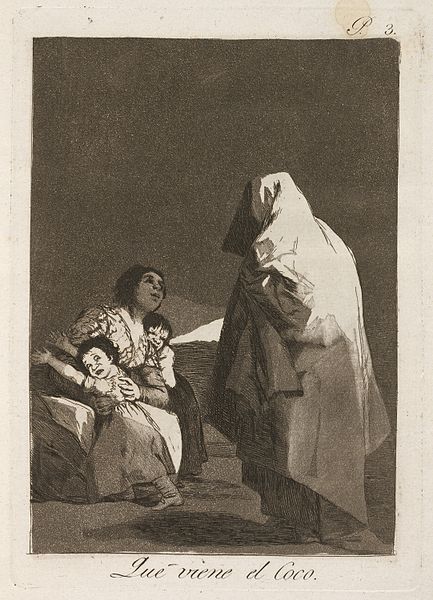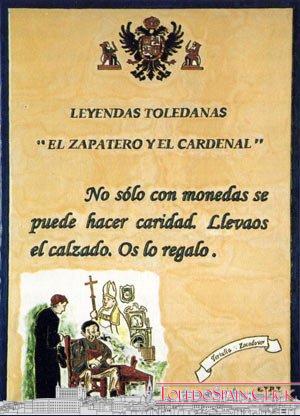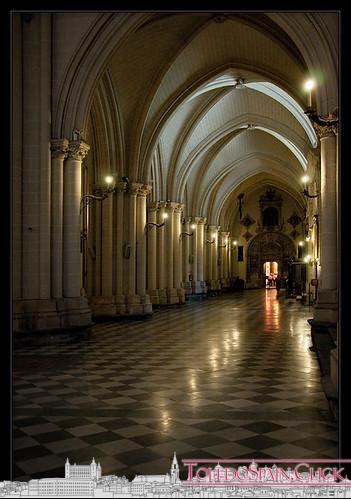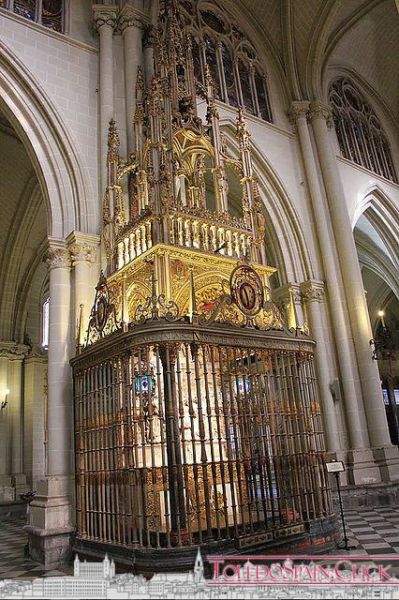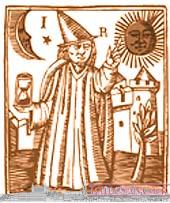Not long ago we were able to share a “new” legend from Toledo found thanks to the great work of dissemination that various institutions and administrations are doing of their funds on the Web, digitizing and giving free access to publications that until now slept on shelves and archives. We are in luck because we have located another tradition that we believe is unpublished in the current publications and lists of legends and traditions, to date. And we proceed to share it with everyone.
Before reproducing the text, we would like to thank the good friend who sent us the “discovery” : Mr. Luis Alberto Pérez Velarde, Curator of the Museo del Greco in Toledo until 2017.
This legend has been found in the “Revista de España”, shared by the National Library in the Digital Newspaper Library, originally published in issue 122 in July and August 1888 and signed by José Zahonero.
THE CHRIST OF THE MOTIN
(TOLEDAN TRADITION)
Mr Felipe Benicio Navarro.
-Oh, sad memories of times that were fortunate for me,” exclaimed Bodoque, punching his face and sadly thinning his voice, “from now on I can assure you, my lord knight, that if as I see myself crippled of the legs, man of the one arm, and not very dexterous with the other, I moved well the members all, maguer had disturbed the celebrity, my misfortune would not be so great; that there is no affliction as the one to conserve awake the sense to attend to the measure of the own evil that one suffers, and to remember as lost the contented ones and the past goods. I say this, because around Zocodover, where the lords soldiers that the King commands for the Indies walk very gallantly, and revive in me the memory of when I was as they are, and as they rejoice in boasts and donaires, I boasted and donairaba very gently.
The gentleman D. Alvaro Alonsos, to whom they were addressed, did not attend to these reasons, because it is a natural condition of every young man in love to divert his thought only in the imaginations, tastes and sorrows of the desire that, when it is not fulfilled, martyrs and properly it is believed that it burns the chest with alive fire.
But, at last, giving a strong sigh the waiter, as if he fell, after a space of time, in what was said by the picaro Bodoque, exclaimed:
-You won’t be so unhappy, that you certainly don’t aspire to a good thing, nor are you afraid of losing it, nor are you afraid of loving hobbies, nor would you be given much to have, like me, to abandon Toledo, leaving the most beautiful and demure maiden there can be in the world! So, I say to you, let’s talk, above all, about what matters to me, and that is: as is your custom and that of all the rascals of the exercise of begging, approaching as if you were going to demand alms from the ladies, and putting in their hands the letters of their lovers, do the same with Teodora when she comes out of mass tomorrow.
-I will not do so, for I run the risk of being condemned by the Corregidor to lashes,” replied Bodoque.
-I would not take you for new, for you have already handled the oar and put iron on the feet in the galleys of H. M.; for in these, and not in other wars, you have seen yourself; besides, a new jacket and tights must be worn for you, carrying a whole bag with some shields to the rear.
-Give them to me, Mr. Knight, for I will govern myself skillfully so that I am not surprised by Mr. Corregidor’s search hooks, for I am not even painted for such enterprises; When more than tonight, I believe, there will be revolt in the city, because there are many discontents that has in it Mr. Corregidor; and as long as everything is disturbed, it must be easy for you to see that maiden, as long as her father hastens to put out the fire of the fury and the tumult gives the people.
I’m sure you’re also interested in: Pilgrimage of the Virgin of the Valley in Toledo (updated 2023)
The gentleman didn’t know what Bodoque was talking about, who told him Things he didn’t expect to hear. It was the case that there was in one of the narrow streets of Toledo, and towards the Jewish quarter, a Holy Christ, kept in an open hole in the corner of a small and miserable house; two lanterns burned on either side of the image, at all hours of the day or night. Those charged by their own vow to keep the lights constantly on were the beggars of the city, among whom more were the rogues than the needy; with this they all asked for the light of the Most Holy Christ, and asked, when they did not steal, daily, more than it would have taken to light the image for a century. Such abuse had wanted to repress Mr. Corregidor, deciding to put on his own the lights and pursue the maltrapillos who made the devotion a pretext for leaving the bags of people enjutas, and the decision had to anger the scoundrel to extremes point.
D. Alvaro, who was the account of Mr. Corregidor and his investigators and hooks, had very little to look out for; and so, after Bodoque had repeated his charge to the picaro, he went to walk along the banks of the Tagus, resting, after all, in the shade of some pompous trees, with extensive branches and infinite leaves, which to the delight of rest they invited.
II
When late at night the young man D. Alvaro returned to the city, the narrow streets were lonely; the moon beautiful with its soft light those beautiful architectures of temples and palaces that enrich the imperial city, and the young gentleman was submerged in his thoughts, and as if his own desire did not lead him to the house of his beloved, he went there, step by step, afraid and warned.
-Is it not unjust of the abhorred fate that I have loved Theodora, and she has loved me, that we have both loved each other since childhood, and that my father and hers, no matter how fierce they may have become, and have felt long after our love for their children, I am doomed to go with the King’s soldiers, and she to the narrow, dark cell of a convent?
Finally, the gentleman D. Alvaro approached the fence and knocked on the window, which then, after a few moments, opened.
The Corregidor was roaming the Jewish quarter; at the end of the street where Teodora lived, the two lanterns of the Christ of the Beggars shone, balanced by the air, which later took, as can be seen in the stories, the name of “The Christ of Mutiny”.
-I’ve heard, Theodora, that your father roams the other side of town.
-My God, do you dare to come here?” replied the beautiful maiden with a sweet and timid voice.
-Nothing in the world is a force that can separate us; give me your hand, for I want to caress that softness of its snow; I believe myself to be happy, well I will be given to swear it, because I feel the perfume of your mouth; what lips yours, grosetuelos and reds, fresh and so beautifully formed! Oh, I would like to die attached to this grille, leaving my soul with my eyes in yours!
– Alvaro, for God’s sake, run… run… they may surprise us!
-Hurry up, it would be better if they jumped headlong into hell! Yes, I am a fool, Teodora; it is not to love to surrender cowardly to lose the good we love.
The young man’s blood was boiling; never, truly, as then, did the violence of Theodore’s passion increase in his soul in such a way that Theodore had instilled in him.
The voice of the maiden was given as sweetly as those slight noises produced by the slight breeze, either when it caresses the leaves and branches, or when it passes through the flowers drying the humidity of the dew on them.
There are many gifted people in the world who, with their narrow virtues and thinness, as well as their unsavory morals, condemn the tastes of youth and are lectured sermons that saturate the sweet hopes in the offspring; They are but greedy for losing the good that fortune offers to others, and being already bent over by misfortunes, countermade by old age, cold by death that, at the appointed point awaits them, they curse of contentment and joy, they find love a crime, madness the enchanted imaginations of the tender and pure desires of youth; to such censors it shall not seem excusable that, snatched D. Alvaro for the passion, would propose a desatinadoproject to his beloved.
The maltrapillos had not yet gone, as was their custom, to stoke the lanterns of their Christ; the Corregidor, no doubt, had not determined either to keep the image and turn on the buscons who tried to disobey their orders; it was a diabolical work to make the Christ and the lights disappear, to provoke of course the feared revolt, and the guard of the barabond and confusion, to use himself to flee D. Alvaro with his beloved to hide, until the Corregidor, to cover his honor, forgave them…
How hard it was to convince Teodora, in whom the respect of virtue and honest modesty could almost as much as the lively love he felt for D. Alvaro!
Once surrendered and forced she took a disguise, which was, as they say, a nice suit of a teenage brother still, and sneaked out into the street, trembling with fear and shaken the heart by a thousand contrary affections: the joy of seeing herself with her lover, the pain of escaping from the paternal house, an uncertain hope, an eager desire, a deep sorrow and an intense contentment.
D. Alvaro took her in his arms, and going to the corner where the Christ was, left his sweet load on the floor, and leaning on a grille he broke the glass of the urn, took the image out of it, extinguished the lanterns, and going down quickly, he took his beloved in his arms again, and escaped through the intricate labyrinth of narrow streets of the imperial city…
Hours later, the silence was followed by a diabolical din; the rogues, the virotes, the bigards, the flower and foam of the maltrapillados, made a roar of noise, a grumble of gresca and the noise of revolt… All the rowdy people of the great city shouted in rebellion against the Corregidor who had kidnapped them their Christ… the Christ that the truhanería claimed to be theirs.
The Corregidor did not manage to understand what had happened, and much less when he knew, not with less horror, that besides stealing the Christ from the rogues, they had stolen his daughter… which was more serious and embarrassing.
There was no way to calm the agitation or return to order until the rogue Bodoque, already sighted with D. Alvaro, had to tell the Corregidor, that as he agreed to marry his daughter with the young man and send candles and candles to the bridge of Alcantara the next day, and allow the picaros worship his Christ, everything would be quiet in the republic, and so it was, that had to be done as Bodoque prevented, and D. Alvaro Alonso married the beautiful Theodora.
In nothing have we wanted to put neither point more nor less than what we were referred to before the niche and the image that exists in the site itself, and that has the names of Santo Cristo del Amor or Cristo del Motín, something that will worry the roelibros and search for gossip of blessed tradition; so, reader, that they seek it with more extensive data; you enjoy health and I do not lack.
José Zahonero.
This legend has been found in the “Revista de España”, shared by the National Library in the Digital Newspaper Library, originally published in issue 122 in July and August 1888 and signed by José Zahonero.

